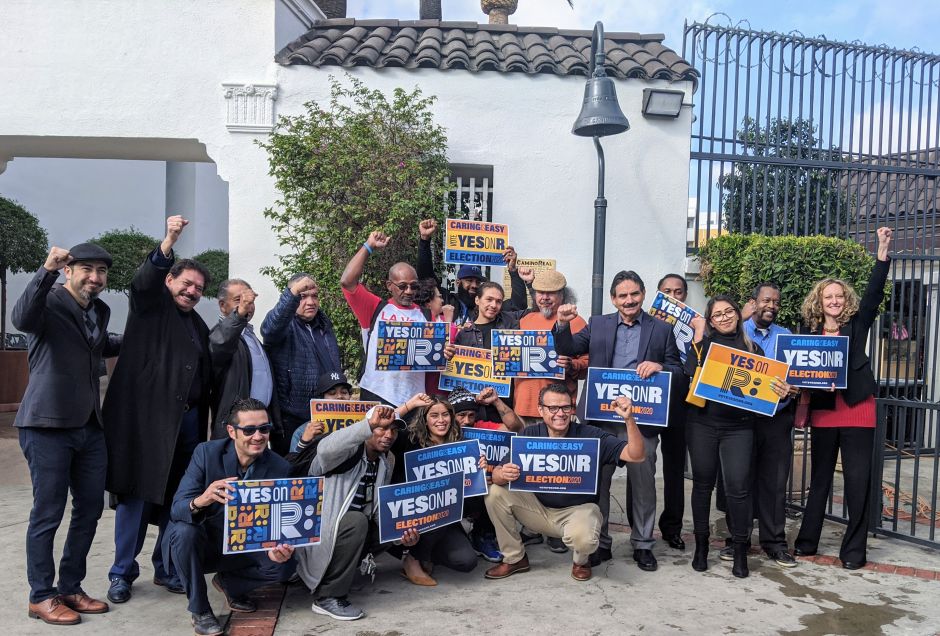Latino and African-American leaders come together to advocate for Measure R that seeks options to reduce incarceration.
Damián Wiseman was very young when he began to get involved in crimes of small magnitude such as robberies. This took him to jail for the first time in his teens; In addition, when he was released he had no options or resources, so all that led him to be part of the Los Angeles County prison system over and over again for 20 years.
“I was a child and there were no programs in the schools, there were no YMCA’s, no resources to help me get ahead,” said Wiseman who is now 47 years old.
Wiseman accepts that if he had obtained the necessary help to rejoin society, his stay in prison would have been less. He qualifies the conditions to which he was exposed as unbearable.
“No one should live like this. They make you sleep on the floor where you find an available area, and nine times out of 10 there are no sheets or mattresses (for sleeping), ”Wiseman said.
He remembers that on some occasions when he entered the prison he was not even given a hygiene package with basic necessities such as a brush, toothpaste or deodorant.
"If you ask them they ignore you or they tell you that you feel (with rudeness) and make you feel so bad that you better not ask for anything anymore," he said.

Wiseman said there are no educational opportunities, there are no resources to obtain the documents, such as social security, nor is there help for the mentally ill. It is common to see mentally ill people jailed with healthy people or people who were jailed for owing a fine, mixed with murderers and criminals.
“When you're sick they don't help you. Once I had pain in my tooth. It was a small tooth decay but I had a lot of pain and for days they didn't do anything until they took me to the dentist and just removed it, ”said the young man.
On another occasion he said he was locked up with mentally ill people who usually defecate everywhere and nobody cleans. "After (the staff) you just slide (the tray) of your food down and everything gets dirty," Wiseman said. "That is not hygienic, it is not healthy and it is not correct."
After experiencing many injustices within the prisons of Los Angeles County, Wiseman decided to move forward on his own and eight years ago he was the last time he set foot in jail.
He now works for the Shields for Families organization helping others who have left the prison system to return to society in a positive way.
"We offer them help with job training, substance control, school, housing and necessary treatments," said Wiseman.
United with one goal
Shields for Families is part of the entities that advocate for the adoption of Measure R of Los Angeles County.
The measure proposes to invest in mental health treatments and rehabilitation. It will also give citation power to the civil oversight commission (COC) of the sheriff's department to investigate misconduct independently. And the county must redirect the savings by reducing the prison population for public priorities such as drug treatment, housing and mental health aid.
Latino and African-American leaders in Los Angeles and organizations such as Black Likes Matter joined on Wednesday to announce a collective effort to vote Yes on measure R and to ensure that county voters understand what the measure means.

“We want our neighbors, children and family members to be treated with dignity,” said Francisco Moreno, representative of the Council of Mexican Federations (COFEM).
Moreno said that conditions must change within prisons and that when leaving people have the opportunity to receive a second chance.
"That's why Latinos are fighting alongside the African-American community that has led the reforms that have disproportionately impacted our families," said Moreno. "80% of the people in jail (Los Angeles County) are Latino and African American."
Those present asked elected officials to join the cause to support Measure R and pledged to continue disseminating information about the measure with communities of color.
Guadalupe Gomez, president of the Santa Ana Zacatecan club, said community centers for young people should also be expanded and more housing infrastructure created to prevent people from ending up in prisons.
"The prisons are overcrowded and that is why it is important to take out all these people who committed minor crimes and are not violent," Gomez said.
Raúl Macías, president of the Anáhuak association, a soccer league with more than 3,000 young members, agreed with the above and added that a solution added to the reform is to create parks and not prisons.
"If we want to reduce juvenile delinquency, it is not putting young people in jail, it is creating recreational programs with good development," said Macías. "Create programs because prisons that are managed for business purposes will never give a good result."






